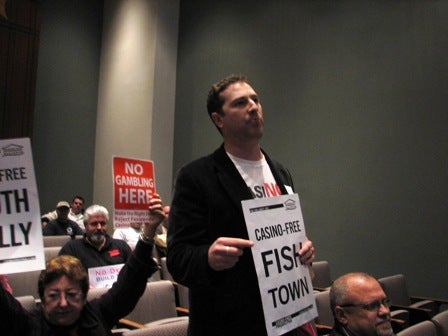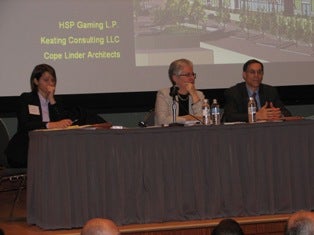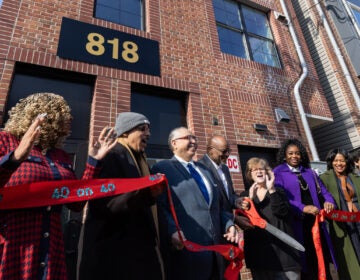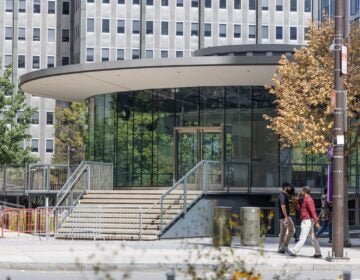Riparian fight could be court-bound

Nov. 15
By Kellie Patrick Gates
For PlanPhilly
Promising to bring new jobs, a great entertainment option, and a leafy, public, riverfront promenade, SugarHouse Casino developers Thursday asked the Philadelphia Commerce Department for the right to build on land that is sometimes submerged beneath the Delaware River.
The audience was so agitated much of the testimony on all sides was hard to hear over whistles and jeers. And three anti-casino activists – including Casino-Free Philadelphia Organizer Jethro Heiko – were escorted from the room by security. No decision was made Thursday, but Director Stephanie Naidoff said she would decide in days or weeks on the request.
Casino supporters pled with Naidoff to say yes to the request, because they said the casino would boost the local economy and create employment opportunities in a neighborhood that has seen its former industrial might deteriorate.
So said FACT members Anna Orth, 72, and Regina Clark, 57, who came to the meeting wearing SugarHouse t-shirts.
“Originally, Fishtown was a great industrial area, but it has not been that way for many years,” said Orth. “I’m going to apply for a job – part time, in customer service.” Clark said she won’t work at SugarHouse, because that would mean she couldn’t enjoy the slots.
Opponents said Naidoff should say no, as neither the waterfront nor any area close to a residential area was the right place for a casino, which they fear will decrease property values and increase traffic and crime.
“Casinos are not healthy for cities,” said Mary O. Reinhart, a member of Casino-Free Philadelphia who chanted “No, No, No!” when casino advocates said something with which she did not agree. Reinhart, who lives closer to the proposed Foxwoods site, said if the city gives SugarHouse riparian rights, Foxwoods would come asking, too. (Foxwoods changed its building plans several months ago and now says it does not require riparian rights, although critics contend the new plans still include some state-owned lands.)
Several elected officials said Naidoff shouldn’t make any decision, because the whole hearing was an illegitimate attempt by SugarHouse to circumvent the state legislature, which should be the body deciding whether to give SugarHouse permission to build on state-owned riparian property.
But most of what was said, yelled or heckled will have little bearing on the decision Naidoff will make.

While State Rep. Michael O’Brien and State Sen. Vince Fumo argued that the Commerce Department has no legal standing to grant riparian rights, Naidoff will take the counsel of City Solicitor Romulo L. Diaz Jr., who said a 1907 state statute gives her the right to decide.
“There are means to appeal – they can take it to court,” Naidoff said.
It seems likely that no matter what her decision is, someone will to just that.
City Council authorized the hiring of an attorney on Thursday. “Should the commerce department rule in favor of SugarHouse, City Council will appeal,” said Brian Abernathy, spokesman for Councilman Frank DiCicco.
SugarHouse is already frustrated at what it sees as inordinate delays on the part of the city. It has filed lawsuits on other casino-related fronts.
Fumo Spokesman Gary Tuma said that to allow the commerce director to decide the riparian rights issue would establish precedent for the city to control all riparian lands within its boundaries, with no say from the state.
The state defines riparian rights as the land from the pier head – the boundary of the shipping channel – to the bulkhead or the place on shore where a bulkhead would be.
Traditionally, these rights were granted with an act of the general assembly, via a bill proposed only by a legislator whose district contains the land – in the case of SugarHouse, O’Brien and Fumo. Leases were commonly granted at the rate of $1 for 99 years. But with the recent elevated interested in developing Philadelphia’s waterfront, Gov. Ed Rendell called a moratorium on riparian rights, and the state took 14 months to determine how to ensure the state was adequately compensated for them.
In June, the Department of General Services announced a new rate structure: $5 per square foot. At the time, DGS estimated that SugarHouse would pay roughly $2 million for a 99-year lease.
Tuma said a Commerce Department precident would mean any developer who couldn’t get rights through the legislature or didn’t want to pay for a state lease could just go to the commerce department.

But Rendell Spokesman Chuck Ardo said no one will get out of paying anything. “We believe that even if the Commerce Department grants the rights, all the entities will still have to work out an arrangement to lease the land (with the Department of General Services). They will still have to pay the Commonwealth for the use of its property. I think what we are seeing here is a power-sharing arrangement that still allows the Commonwealth to have major input into the final product.”
Power would be shared between the City Commerce Department and the Department of General Services, but what about the state legislature, which has traditionally granted riparian rights?
“I don’t know that more local control is necessarily a bad thing,” said Ardo.
But he also said that it’s “hard to say how much of a precedent” a SugarHouse decision would set because … “the circumstances here are unique, because the Casinos in question in this issue are so important – so fiscally important for providing property tax and wage tax relief.”
Philadelphia’s proposed casinos are important to the governor because he has plans to send money from them into wage tax relief and the expansion of the convention center.
Any change in how riparian rights are granted would apply only in Philadelphia, not in the rest of the state.
SugarHouse has tried to get riparian rights through local channels. But neither Fumo nor O’Brien are willing to do that without consent of the neighborhood associations – and most of the associations are fighting the casinos’ proposed locations.
Last month, SugarHouse announced it had found another route: The 1907 law.
At Thursday’s hearing, Diaz testified that SugarHouse is correct. Not only does the 1907 law give the director of commerce the right to grant riparian rights, he said, but this is a “long-standing tradition” in Philadelphia going back to the charter of William Penn. And in 1978, he said, the state Attorney General affirmed that view.
But Christopher B. Craig, the counsel for the Senate Democratic Appropriations Committee who did the legal research for Fumo, said there were two 1907 laws, and the one that said the Commerce Director had jurisdiction “to grant permission for construction into the riverbed” was repealed in 1978 – shortly after the Attorney General had interpreted it.
The one left standing applies only to wharves, piers, docks and other harbor structures.
“A casino may be a structure placed on a harbor, but it is not a harbor structure,” Fumo said during his testimony.
In December, the House of Representative’s State Government Committee will hold a hearing to determine the validity of the Commerce Department hearing.
Kellie Patrick Gates is a former Philadelphia Inquirer reporter. Contact her at kelliespatrick@gmail.com
WHYY is your source for fact-based, in-depth journalism and information. As a nonprofit organization, we rely on financial support from readers like you. Please give today.






